

SEPTEMBER • VOL. 9 • SERIES OF 2022
INSIGHTS is a monthly publication of BDB LAW to inform, update and provide perspectives to our clients and readers on significant tax-related court decisions and regulatory issuances (includes BIR, SEC, BSP, and various government agencies).

DISCLAIMER: The contents of this Insights are summaries of selected issuances from various government agencies, Court decisions, and articles written by our experts. They are intended for guidance only and as such should not be regarded as a substitute for professional advice.
Copyright © 2022 by Du-Baladad and Associates (BDB Law). All rights reserved. No part of this issue covered by this copyright may be produced and/or used in any form or by any means – graphic, electronic, and mechanical without the written permission of the publisher.
What's Inside ...
- HIGHLIGHTS FOR SEPTEMBER 2022
- SIGNIFICANT COURT DECISIONS
- Supreme Court
- Court of Tax Appeals
- SIGNIFICANT REGULATORY ISSUANCES
- Bureau of Internal Revenue
- Securities and Exchange Commission
- Bangko Sentral Ng Pilipinas
- Department of Finance
- Insurance Commission
- PUBLISHED ARTICLE
- The Standard of Reasonableness
- OUR EXPERTS
- The Personalities
- The Personalities


HIGHLIGHTS for SEPTEMBER 2022
SUPREME COURT DECISIONS
-
A tax liability may be compromised at any stage of taxation subject to certain rules and exceptions provided in the revenue regulations issued by the BIR. (Commissioner of Internal Revenue v. Oriental Assurance Corporation, G.R. No. 251677, July 28, 2021, date uploaded: August 26, 2022)
-
The primary test for the distinction between a holding company and a financial intermediary contemplates regularity of function. (City of Davao, et. al. v. ARC Investors, Inc., G.R. No. 249668, July 13, 2022)
COURT OF TAX APPEALS DECISIONS
-
The CTA Division has the authority to consider in its decision the question on the scope of authority of the revenue officers who were named in the LOA even though the parties had not raised the same in their pleadings or memoranda. (The Merry Cooks, Inc. v. CIR, CTA Case No. 10004, August 18, 2022)
-
The burden of collecting the subject VAT remains with the CIR. As such, it is the CIR who has the authority to decide on the refund claim of Petitioner pursuant to Section 4 of the NIRC of 1997, as amended. (TKH Marketing v. Bureau of Customs, CTA Case No. 9911. August 8, 2022)
-
The mere act of signing the various memoranda by other revenue officers does not negate the validly issued LOA in favor of the revenue officer named in the LOA, nor does it invalidate the assessments. (Commissioner of Internal Revenue v. Robinsons True Serve Hardware Philippines, Inc., CTA EB No. 2293, [CTA Case No. 9418], August 3, 2022)
BIR ISSUANCES
-
Revenue Memorandum Circular No. 120-2022, August 18, 2022 – This provides Additional Guidelines and Procedures on the Manner of Payment of Penalty Relative to Violations Incurred by Registered Business Enterprises (RBEs) in the Information Technology-Business Process Management (IT-BPM) Sector on the Conditions Prescribed Regarding Work-From-Home (WFH) Arrangement for the Period April 1, 2022 until September 12, 2022
-
Revenue Memorandum Circular No. 121-2022, August 4, 2022 – This provides for Guidelines on the Lifting of Suspension of Field Audit and Operations Pursuant to Revenue Memorandum Circular No. 77-2022.
-
Revenue Memorandum Circular No. 123-2022, August 30, 2022 – This provides clarifications on the Provisions of Revenue Regulations No. 6-2022 Relative to the Removal of the Five (5)-Year Validity Period on Receipts/Invoices
SEC ISSUANCES
-
SEC-OGC Opinion No. 22-10, August 15, 2022 – This is an opinion regarding Real Estate Investment Trust (REIT).
-
SEC-OGC Opinion No. 22-11, August 19, 2022 – This is an opinion regarding License to Transact Business by a Philippine branch of a non-resident foreign corporation.
-
SEC Memorandum Circular No. 7, s. 2022, August 11, 2022 – This provides the rules on Qualified and/or Eligible Personal Equity and Retirement Account (PERA) Investment Products
BSP ISSUANCES
- BSP Circular No. 1151, Series of 2022, August 24, 2022 – This amends the Minimum Capitalization of Rural Banks
DOF ISSUANCES
- DOF Opinion No. 014-2022, August 12, 2022 – Whatever tax was imposed on the sale of the business, as the main transaction, is also imposed on the transfer of the attached goodwill valued by the seller to be paid by the buyer.

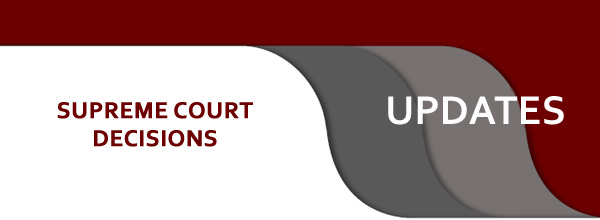
A tax liability may be compromised at any stage of taxation subject to certain rules and exceptions provided in the revenue regulations issued by the BIR.
The taxpayer was assessed for alleged deficiency DST. The CIR issued a Warrant of Garnishment against the taxpayer. The CTA in division and CTA En Banc both ruled that the assessment against the taxpayer is void. Aggrieved, the CIR elevated the case before the Supreme Court but the latter denied the former’s Petition. The CIR then filed a motion for reconsideration.
While the CIR’s motion for reconsideration is pending before the Supreme Court, the taxpayer filed a Manifestation with Motion to Render Judgment Based on Judicial Compromise Agreement requesting the High Court to approve the said agreement executed by both parties.
The Supreme Court found the Judicial Agreement executed by the parties in order. It ruled that a tax liability may be compromised at any stage of taxation subject to certain rules and exceptions provided in the revenue regulations issued by the BIR. The CIR is authorized to compromise, abate, refund or credit taxes. In the absence of any grave abuse of discretion, the authority of the CIR to compromise is purely discretionary and the courts cannot interfere with his exercise of discretionary functions. The Court thus denied the motion for reconsideration for being moot and academic and granted the parties’ Motion to Render Judgment Based on the Judicial Compromise Agreement. (Commissioner of Internal Revenue v. Oriental Assurance Corporation, G.R. No. 251677, July 28, 2021, date uploaded: August 26, 2022)
The primary test for the distinction between a holding company and a financial intermediary contemplates regularity of function.
The taxpayer earned dividends from its preferred shares of stocks in SMC and interests on its money market placements. The City of Davao and its treasurer assessed the taxpayer LBT equivalent to 0.55% of the dividends and interests the latter earned for the third and fourth quarters of 2011.
The Supreme Court ruled that LBT cannot be imposed against the taxpayer. The City of Davao assessed the taxpayer based on Section 143(f), in relation to Section 131 (e) of the LGC. Under Section 143(f) of the LGC, persons liable to pay LBT are banks or other financial institutions by virtue of the nature of their business. LBT are imposed on their gross receipts from "interest, commissions and discounts from lending activities, income from financial leasing, dividends, rentals on property and profit from exchange or sale of property, insurance premium.
The Court emphasizes that the primary test for the distinction between a holding company and a financial intermediary contemplates regularity of function, not on an isolated basis, with the end in mind for self-profit. Here, the taxpayer’s placement of dividends derived from its SMC shares in the market incidentally earning interests does not negate the corporation’s restricted underlying purpose as a holding company. (City of Davao, et. al. v. ARC Investors, Inc., G.R. No. 249668, July 13, 2022)

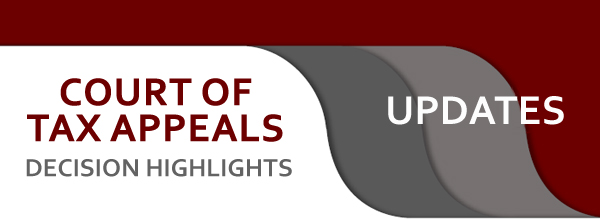
The 30-day period to elevate a claim for refund to the CTA commences after the receipt of the CIR’s decision or ruling or after the expiration of the 120-day (now 90-day) period, whichever is sooner.
In this case, the taxpayer failed to submit competent evidence that its clients are nonresident foreign corporations doing business outside the Philippines. The taxpayer presented “foreign business registration printouts.” However, in lieu of submitting duly authenticated proof of official foreign record, the taxpayer submitted mere printouts thereof, retrieved from AMINET database.
The Court partially denied the taxpayer’s claim for refund of unutilized input VAT for the first quarter of CY 2017. The Court held that for purposes of VAT zero-rating under Section 108(B)(2) of the Tax Code, the claimant must establish the two components of its client’s status as a non-resident foreign corporation, namely: (1) it is not a domestic corporation; and (2) it is not engaged in trade or business in the Philippines.
Thus, failure to present proof of the second element, i.e., that the affiliate is not doing business in the Philippines, is fatal to its claim for refund. Taxpayers are not precluded from adducing other competent evidence to prove an entity’s status as a non-resident foreign corporation. (Commissioner of Internal Revenue v Deutsche Knowledge Services, CTA EB No. 2423 (CTA Case No. 7921, July 01, 2022)
The taxpayer filed a claim for refund of its unutilized input VAT for the period from August 1, 2003 to December 31, 2004.
The Court En Banc affirmed the CTA third division’s decision denying the judicial claim for refund. It ruled that the judicial claim was filed out of time. An administrative claim for refund must be filed with the BIR within two (2) years after the close of the taxable quarter where the sales were made. In case of an adverse decision or ruling, or inaction of the CIR, the taxpayer is given a period of 30 days from receipt of the decision or ruling, or the expiration of 120-day (now 90-day) period fixed by law to file a Petition for Review. The Court En Banc emphasized that the 30-day period commences after the receipt of the CIR’s decision or ruling or after the expiration of the 120-day period, whichever is sooner.
In this case, the taxpayer filed its administrative claim for refund on August 30, 2005. Thus, the CIR has 120 days from August 30, 2005 or until December 28, 2005, to act on the taxpayer’s administrative claim for refund. Thereafter, the taxpayer had 30 days, or until January 27, 2006 to challenge CIR’s inaction. However, the taxpayer belatedly filed its Petition for Review on September 27, 2018 under the assumption that the 30-day period to appeal to the CTA should be reckoned from August 28, 2018, the receipt of the decision on its administrative claim for refund. (Pulp Specialties Philippines, Inc., CTA EB No. 2575 [CTA Case No. 9936], August 31, 2022)
The period of prescription for tax cases begins to run from the discovery and institution of proceedings for its investigation and shall only be tolled by the filing of information with the Court.
A criminal action was filed against the taxpayer for alleged violation of Section 255 of the Tax Code, as amended for her alleged willful violation to supply correct and accurate information in her ITR for taxable year 2007.
The CTA dismissed the criminal case filed against the taxpayer on the ground of prescription. The period of prescription for the offense charged against the taxpayer is 5 years. Applying the decision of the Supreme Court in Lim v. CTA, the CTA ruled that the period of prescription for tax case begins to run from the discovery and institution of proceedings for its investigation and shall only be tolled by the filing of information therefor with the CTA.
Here, the information was filed way beyond the prescriptive period of 5 years. Clearly, the criminal action against the taxpayer had long prescribed. (People of the Philippines vs. Remedios De Juan Pensotes, CTA Crim. Case No. O-685, August 22, 2022)
There must be grant of authority, through a LOA before any revenue officer can conduct an examination or assessment.
The Court declared null and void assessment for deficiency taxes for taxable year 2010. The Court held that there must be grant of authority, through a LOA before any revenue officer can conduct an examination or assessment. In the absence of such authority, the assessment or examination is a nullity.
In the present case, the reassignment of the examination of taxpayer’s books to RO Cruz, RO Vega, and GS Zamora through revalidation violated RMO No. 43-90, which stated that any reassignment/transfer of cases shall require issuance of new LOA. Anent the MOA issued in favor of RO Gazzingan and GS Gorospe, it was held void as it is not proof of the existence of authority of the substitute or replacement revenue officer. Thus, the revalidation of LOA and the issuance of the MOAs are insufficient to clothe them with authority to conduct the examination of taxpayer. Accordingly, the subject assessments are void and bear no valid fruit. (Tricom Systems (Philippines), Inc. v Commissioner of Internal Revenue, CTA Case No. 9514, July 07, 2022)
Failure of petitioner and its counsel to appear during the pre-trial conference and to file a pre-trial brief without a valid cause shall warrant the dismissal of the case.
The Court held that failure of petitioner and its counsel to appear during the pre-trial conference and to file a pre-trial brief without a valid cause shall warrant the dismissal of the case. What constitutes a valid cause is subject to the Court's sound discretion and the exercise of such discretion shall not be disturbed except in cases of clear and manifest abuse. Moreover, the pre-trial cannot be taken for granted. It is more than a simple marking of evidence. It is not a mere technicality in court proceedings for it serves a vital objective: “the simplification, abbreviation, and expedition of the trial, if not indeed its dispensation." It follows then that the pre-trial should not be ignored, as petitioner had.
Here, as a lawyer who must know the mandatory nature of a pre-trial and the adverse consequences of the failure of a party to appear at the pre-trial, petitioner's counsel had every opportunity and could have informed the Court of his illness before the scheduled pre-trial, had there been truth to his allegation. He did not. Instead, petitioner's counsel electronically filed his Manifestations which merely asked for two 15-day extensions to file petitioner's pre-trial brief without giving any justifiable cause, let alone notice, for his non-appearance at the scheduled June 6, 2022 pre-trial, despite referring it at his Manifestations. He did not move to postpone the pre-trial, nor did he mention his illness in his Manifestation, and the same was filed late. (Xepil Packaging represented by Suat Tee D. Poa v. BIR Region 7A, Quezon City, CTA Case No. 10701, August 18, 2022)
The CTA Division has the authority to consider in its decision the question on the scope of authority of the revenue officers who were named in the LOA even though the parties had not raised the same in their pleadings or memoranda.
This resolves CIR’s Motion for Reconsideration, arguing that petitioner did not question the RO's authority to conduct the tax examination neither in its Petition for Review, Pre-Trial Brief, nor defined in the Pre-Trial Order. Thus, the Court erred when it ruled such issue that was never raised by the taxpayer.
The Court held that CTA Division has the authority to consider in its decision the question on the scope of authority of the revenue officers who were named in the LOA even though the parties had not raised the same in their pleadings or memoranda.
Here, holding that it may be true that the issue on the authority of the RO to conduct the tax examination was not raised by the taxpayer in its pleadings, however, this Court is not precluded from ruling on such issue under the rules and regulations, and jurisprudence. The determination of the RO's authority is necessary in the achievement of an orderly disposition of the instant case as the validity of the assessment emanates from the valid authority of said RO. Moreover, the LOA is a document that will satisfy the valid delegation of authority by the CIR to his representatives of his power to make assessment under the 1997 NIRC, as amended. (The Merry Cooks, Inc. v. CIR, CTA Case No. 10004, August 18, 2022)
The remedy of the party adversely affected by the ruling of the District Collector of Customs is to file a written protest to the BOC Commissioner at the time when payment of the amount claimed to be due is made, or within fifteen (15) days thereafter.
Petitioner alleged that in case of inaction on the part of respondent BOC Commissioner after the lapse of the thirty (30) day period to act on its Petition and Appeal for Customs Duty, such inaction shall be deemed a denial. Hence, petitioner elevated the instant case to the CTA within thirty (30) days from the expiration of the aforementioned period.
The Court held that the remedy of the party adversely affected by the ruling of the District Collector of Customs is to file a written protest to the BOC Commissioner at the time when payment of the amount claimed to be due the government is made, or within fifteen (15) days thereafter, otherwise, the action of the District Collector shall be final and conclusive.
Here, petitioner admitted in its Petition for Review of Protest and Appeal for Duty and Tax Refund that it paid the customs duties on October 15, 2021. Petitioner had fifteen (15) days therefrom or until October 30, 2021, within which to file a protest before the BOC Commissioner. Petitioner only filed its protest on November 24, 2021, or twenty-five (25) days late. (Millionstar Grains Corp. v. Hon. District Collector of Customs and Commissioner of Bureau of Customs, CTA Case No. 10770, August 18, 2022)
The CTA is not precluded from accepting evidence that was not presented at the administrative level.
Attribution of the input VAT to the zero-rated sales need not always be direct
In a recent case of Commissioner of Internal Revenue v. McDonald's Philippines Realty Corp., the Supreme Court emphasized that due process requires the identification of tax agents authorized to continue the tax audit or investigation through an LOA. Taxpayer should be informed of the names of the tax agents who are duly authorized to conduct examination and assessment of the taxpayer's books and accounting records through an LOA. It is a jurisdictional requirement of a valid audit and therefore a valid assessment. There has to be a link between the LOA and the revenue officer who will conduct an examination of the taxpayers books of accounts and accounting records.
Moreover, the purpose of a Mission Order is different from an LOA. A Mission Order is issued to authorize the surveillance pursuant to Section 6(C) of the Tax Code, as amended, not the audit and assessment, of the taxpayer.
Here, the revenue officers involved in this case were not authorized by virtue of an LOA to conduct an examination and inspection of the taxpayer’s books of accounts, their authority having emanated from a Mission Order, the assessments resulting therefrom are inescapably void and must be slain at sight. Needless to say, void assessments bear no valid fruit. (CIR v. Autostrada Motore, Inc., CTA EB No. 2375 (CTA Case No 9624) July 21, 2022)
For the presumption of correctness of assessment to apply, the assessment must be based on fact.
The taxpayer filed a judicial claim for refund of its unutilized input VAT for the 3rd Quarter of taxable year 2014 to which the CTA Division granted. The BIR, thus, moved to reconsider the Court’s decision arguing that: (1) the CTA Division erred in ruling that respondent is allowed to present new and additional evidence before it, and (2) for an input tax to be attributable to zero-rated sales, it must be shown that “the connection between the purchases and finished product is ‘direct’ and ‘concrete.’
In ruling against the CIR, the Court En Banc emphasized and reiterated the Supreme Court’s ruling in Philippine Airlines, Inc. vs. CIR, that the CTA, being a court of record, the cases filed before it are litigated de novo and party litigants should prove every minute aspect of its case. The power of the CTA to exercise its appellate jurisdiction does not preclude it from considering evidence that was not presented in the administrative claim in the BIR.
The Court En Banc also emphasized that Section 112 of the NIRC allows allocation of creditable input taxes which cannot be directly or entirely attributable to zero-rate sales. Creditable input taxes which cannot be directly or entirely attributable to any sale transaction, shall be allocated proportionately on the basis of the volume of sales. Evidently, contrary to the CIR’s allegation, the attribution of the input VAT to the zero-rated sales need not always be direct. (Commissioner of Internal Revenue vs. Philippine Geothermal Production Company, Inc., CTA EB No. 2453, August 17, 2022)
The Court of Tax Appeals can exercise jurisdiction over a criminal case under the Tariff and Customs Code referred by the Court of Appeals.
A case for Smuggling under Section 3601 of the Tariff and Customs Code of the Philippines was lodged before the CTA against an accused. Accused then questioned the jurisdiction of the CTA in taking cognizance of the Smuggling case filed before it.
CTA Division ruled that it has jurisdiction over the case. The CTA Division explained that when a court has no jurisdiction over the subject matter, the only power it has is to dismiss the action. Without jurisdiction to take cognizance of accused-appellant's appeal, the CA should have dismissed, as a matter of course, the appeal outright, and not transfer or refer the same to the appropriate court, which in this case is this Court.
However, the CA referred accused-appellant's appeal to the CTA by invoking the ruling of the Supreme Court in Rolando S. Sideno vs. People of the Philippines. (People of the Philippines vs. Ian Christopher Miguel Y Bayoneta, CTA Crim Case No. A-7, August 10, 2022)
The burden of collecting the subject VAT remains with the CIR. As such, it is the CIR who has the authority to decide on the refund claim of the taxpayer pursuant to Section 4 of the NIRC of 1997, as amended.
On April 8, 2014, the taxpayer paid under protest the taxes and fees for its importation. On April 15, 2014, the taxpayer filed a protest with the District Collector (DC) of the BOC, asking for a refund of its excess VAT payment. The DC, Commissioner of Customs (COC), and Secretary of Finance (SOF) all granted the refund. In a letter dated November 21, 2016, the COC endorsed to the CIR the taxpayer’s claim for refund. The CIR advised the COC that he could no longer entertain the claim for refund because the two-year prescriptive period under Sections 204(C) and 229 of the NIRC has already lapsed. After the taxpayer was informed by the COC of the CIR’s letter, the taxpayer filed a Petition for Review with the CTA on August 22, 2018.
The Court ruled that VAT is a national internal revenue tax, as provided for in Section 21 of the NIRC of 1997, as amended. The COC collected the VAT due on the subject importation pursuant to the delegated authority accorded to him by the CIR pursuant to Section 12(a) of the NIRC of 1997, as amended. In other words, the burden of collecting the subject VAT remains with the CIR. As such, it is the CIR who has the authority to decide on the refund claim of the taxpayer pursuant to Section 4 of the NIRC of 1997, as amended. The Protest with the DC cannot be treated as the administrative claim for refund of VAT, since an application for refund of internal revenue taxes lie within the jurisdiction of the CIR, and not with the COC whose jurisdiction for refund relate to customs duties and fees under the customs law. (TKH Marketing v. Bureau of Customs, CTA Case No. 9911. August 8, 2022)
The second sentence of Section 1117 of the CMTA is applicable only when the District Collector determines that there is no probable cause for the issuance of a warrant of seizure; hence, the issuance of an order of release of the imported goods.
On 3 March 2017, the District Collector (DC) rendered a Consolidated Decision ordering the quashal of the Warrants of Seizure and Detention (WSD) issued against the motor imported motor vehicles of the taxpayer and ordered the continuous processing of the import entries upon payment of additional duties and taxes. On 4 October 2017, the Commissioner of Customs (COC) rendered a Decision, reversing and setting aside the DC’s Consolidated Decision and ordering the forfeiture of the subject vehicles in favor of the government. In its Petition for Review, the taxpayer claimed that the COC's inaction within 48 hours from the issuance of the Consolidated Decision already rendered the shipments as "deemed released", pursuant to Section 1117 of RA No. 10863 or the Customs Modernization and Tariff Act (CMTA).
The Court ruled that the second sentence of Section 1117 of the CMTA is applicable only when the District Collector determines that there is no probable cause for the issuance of a warrant of seizure; hence, the issuance of an order of release of the imported goods. When the District Collector issues an order of release, the COC has a limited period to review the said order (i.e., 48 hours or 24 hours in case of perishable goods); otherwise, the imported goods shall be deemed released. A perusal of the Consolidated Decision reveals that the DC ordered the quashal of the WSDs, and the payment of additional duties, taxes and surcharges for the subject vehicles. It is not an order of release. (Monacat Trading v. Commissioner of Customs, Bureau of Customs, CTA Case No. 9851, August 4, 2022)
The mere act of signing the various memoranda by other revenue officers does not negate the validly issued LOA in favor of RO Guillermo, nor does it invalidate the assessments.
In its MR, the taxpayer alleges that the tax assessment is void due to the lack of authority of the revenue officers to examine its books of accounts. The CIR argues that the LOA authorized RO Vivien Guillermo and GS Marivic Bautista. The inclusion of ROs Paez and Almedilla does not detract from nor destroy the authority granted to RO Guillermo and GS Bautista.
The Court found that RO Vivien Guillermo, who was named in the LOA, was not replaced or transferred. RO Guillermo was present up to the recommendation for the issuance of the assessment notices against the taxpayer. Said actions were conducted by RO Guillermo pursuant to a validly issued LOA. The mere act of signing the various memoranda by other revenue officers does not negate the validly issued LOA in favor of RO Guillermo, nor does it invalidate the assessments. (Commissioner of Internal Revenue v. Robinsons True Serve Hardware Philippines, Inc., CTA EB No. 2293, [CTA Case No. 9418], August 3, 2022)
Mere entry of wrong information in tax returns due to mistake, carelessness, or ignorance, without intent to evade tax, does not constitute a false return.
The CTA En Banc ruled that the mere entry of wrong information in tax returns due to mistake, carelessness, or ignorance, without intent to evade tax, does not constitute a false return.
In this case, the stamping of "Tentative Exempt Organization" on Bethany Hospital's income tax return, even if Bethany Hospital is not a tax-exempt institution but is subject to 10% preferential tax rate, is not sufficient evidence to prove that Respondent intended to evade tax. Thus, it does not constitute a false return. (Commission of Internal Revenue vs. United Church of Christ in the Philippines, CTA EB No. 2346, 02 August 2022)

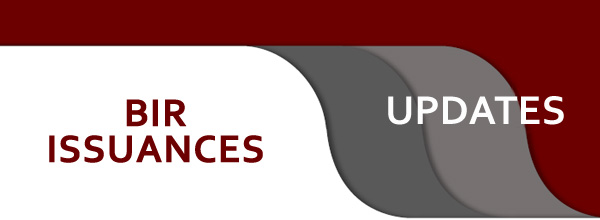
Revenue Memorandum Circular No. 120-2022 dated August 18, 2022
Additional Guidelines and Procedures on the Manner of Payment of Penalty Relative to Violations Incurred by Registered Business Enterprises (RBEs) in the Information Technology-Business Process Management (IT-BPM) Sector on the Conditions Prescribed Regarding Work-From-Home (WFH) Arrangement for the Period April 1, 2022 until September 12, 2022.
The Fiscal Incentives Regulatory Board (FIRB) issued FIRB Resolution No. 017-22 for RBEs in the IT-BPM sector allowing their respective Investment Promotion Agencies (IPAs) to continue implementing WFH arrangement without adversely affecting their fiscal incentives under the CREATE Act from April 1, 2022 until September 12, 2022 only. The number of employees under the WFH arrangement shall not exceed thirty percent (30%) of the total workforce of the RBE, while the remaining seventy percent (70%) of the total workforce shall render work or service within the geographical boundaries of the ecozone or freeport being administered by the IPA with which the project/activity is registered. The total workforce shall refer to the total employees directly or indirectly engaged in the registered project or activity of the RBE but excludes third-party contractors rendering janitorial or security services and other similar activities.
Relative thereto, non-compliance of the RBEs in the IT-BPM sector with the prescribed conditions under FIRB Resolution No. 017-22 for at least one day shall result in the suspension of its income tax incentives for the month when the violation took place. In such a case, the RBEs shall pay, as penalty, the regular income tax of either twenty-five percent (25%) or twenty percent (20%), whichever is applicable, for the aforesaid month. In addition, violations committed beyond September 13, 2022 onwards may subject the RBEs to applicable taxes.
Revenue Memorandum Circular No. 121-2022 dated August 4, 2022
Guidelines on the Lifting of Suspension of Field Audit and Operations Pursuant to Revenue Memorandum Circular No. 77-2022
.
For the information and guidance of all internal revenue officials, employees and others concerned, the suspension of field audit and other field operations on all outstanding Letters of Authority/Audit Notices, and Letter Notices pursuant to Revenue Memorandum Circular (RMC) No. 77-2022 shall be LIFTED on a per Investigating Office upon approval by the Commissioner of Internal Revenue (CIR) of the Memorandum Request from the following:
| Investigating Office | Requesting Official | Recommending Approval |
| Revenue District Offices (RDOs)/Regional Investigation Divisions (RIDs)/VAT Audit Sections/Office Audit Sections | Regional Director | Assistant Commissioner, Assessment Service and Deputy Commissioner-Operations Group (DCIR-OG) |
| National Investigation Division (NID) | HREA, Enforcement & Advocacy Service | Assistant Commissioner, Enforcement & Advocacy Service and Deputy Commissioner-Legal Group (DCIR-LG) |
| Large Taxpayers Audit Divisions/LT VAT Audit Unit | HREA, Large Taxpayers Service-Regular/Excise/Programs & Compliance Group | Assistant Commissioner, Large Taxpayers Service (LTS) |
In any case, no new Letters of Authority (LOAs), written orders to audit and/or investigate taxpayers' internal revenue tax liabilities shall be issued and/or served except: (1) in those cases enumerated under RMC No. 77-2022; and (2) in case of reissuance/s to replace previously issued LOA/s due to change of revenue officer and/or group supervisor.
Revenue Memorandum Circular No. 122-2022 dated August 18, 2022
Updating of Registration Information Record of Taxpayers Who Will Enroll in the Bureau's Online Registration and Update System.
One of the objectives of the Bureau's Digital Transformation Roadmap in 2022-2023 is to deliver a convenient, accessible and fast registration for taxpayers. In this regard, the Bureau will be launching an Online Registration and Update System (ORUS) that will allow taxpayers to register, update and transact registration-related transactions online.
All taxpayers who intend to transact online with the Bureau thru the ORUS, once available, and those who are currently transacting manually for their registration-related transactions, shall update their registration records, such as e-mail address and contact information using the S1905 — Registration Update Sheet (RUS). The RUS is available at the Client Support Section (CSS) of the Revenue District Office (RDO) and the Bureau's Official Website (www.bir.gov.ph) under the Advisory Section.
The designated e-mail address should be the taxpayer's official e-mail address. This shall be used in serving BIR orders, notices, letters and other processes/communications to the taxpayers.
Registered taxpayers shall update their Head Office registration first before updating their branches. In case of employees, employers shall inform their employees regarding this requirement. The RUS may be submitted via e-mail thru the list, to the concerned RDO where the taxpayer is registered.
Revenue Memorandum Circular No. 123-2022 dated August 30, 2022
Clarifications on the Provisions of Revenue Regulations No. 6-2022 Relative to the Removal of the Five (5)-Year Validity Period on Receipts/Invoices.
All receipts/invoices which have expired on or before 15 July 2022 are no longer valid for use.
Pursuant to the provisions of RMO No. 12-2013, all unused and expired receipts/invoices shall be surrendered together with an inventory listing to the RDO where the Head Office or Branch is registered on or before the 10th day after the validity period of the expired receipts/invoices for the destruction of such receipts/invoices.
Taxpayers with receipts/invoices with existing ATP expiring on or after July 16, 2022 may still issue such receipts/invoices until fully exhausted. The phrase, "THIS INVOICE/RECEIPT SHALL BE VALID FOR FIVE (5) YEARS FROM THE DATE OF THE ATP" and the "Validity Period" reflected at the footer of the printed receipts/invoices shall be disregarded.
Taxpayer-users shall be required to reconfigure their CRM/POS Machines/CAS to remove the phrases "THIS INVOICE/RECEIPT SHALL BE VALID FOR FIVE (5) YEARS FROM THE DATE OF THE PERMIT TO USE"/"THIS INVOICE/RECEIPT SHALL BE VALID FOR FIVE (5) YEARS FROM THE DATE OF THE ACKNOWLEDGMENT CERTIFICATE" and "Valid Until (mm/dd/yyyy)." However, it should be noted that a written notification shall no longer be required to be submitted to the concerned RDO although such modifications

SEC-OGC Opinion No. 22-10 dated August 15, 2022
Re: Real Estate Investment Trust (REIT).
Pryce is planning to put up a REIT company under the name "Pryce REIT" pursuant to Republic Act No. 9856 or the REIT Act. Once Pryce REIT is incorporated, Pryce is contemplating on leasing to the former some of its real properties used in the operation of its memorial gardens business. In the alternative, Pryce is also considering conveying to Pryce REIT, either through sale or assignment, their real properties.
The types of income that Pryce generates from the operation of the memorial parks are: a) the sale of the burial lots; b) the sale of double interment right; c) collection of periodic maintenance assessment charges; and d) rentals from the use of the memorial park facilities.
The sale of the burial lots and double interment rights, which are the primary sources of income of the memorial parks, are dispositions of real property assets, thus there would be no generation of recurring income for the REIT selling such real property assets. Upon the sale by the REIT of the burial lots and double interment rights to the buyers, the REIT divests itself of its ownership rights in favor of the buyer. Thus, these properties may not be considered as part of the income-generating real estate assets of a REIT.
Meanwhile, the collection of periodic maintenance assessment charges and rentals from the use of the memorial park facilities may fall under the definition of income-generating real estate as these may generate a regular stream of income, same as the nature of the rentals and user's fees mentioned in the definition of REIT under the REIT Act. 8 In this case, there is no deprivation of the REIT's ownership rights over the real property assets subject of these maintenance assessment charges and rentals on the use of the memorial park facilities.
Pryce may lease or convey, either by sale or assignment, its real property assets used in the operation of its memorial parks business to Pryce REIT, provided that Pryce REIT must ensure that at least seventy-five (75%) of its deposited property must be invested in, or consist of, income-generating real estate as discussed above.
SEC-OGC Opinion No. 22-11 dated August 19, 2022
Re: License to Transact Business.
MAP was incorporated in Singapore and is 100% owned by Mitsui Co. Ltd. of Japan (Mitsui). MAP serves as the regional office of the Mitsui Group in the Asia Pacific region. In this context, the term "Mitsui Group" pertains to Philippine-based companies in which Mitsui owns shares of stock. MAP established a branch office in the Philippines which is registered as Mitsui & Co. (Asia Pacific) Pte. Ltd. Manila Branch (MAP Manila Branch).
MAP would like to have its MAP Manila Branch to be able to lend money in Philippine Peso (PHP) to any member of the Mitsui Group based in the Philippines if the need arises.
SEC ruled that MAP Manila Branch may lend a part of its corporate funds to members of the Mitsui Group without amending its license since the said act is fairly incidental to the express powers granted to the MAP Manila Branch under its License to Transact Business. The management of a corporation, in the absence of express restrictions, has the discretionary authority to enter into contracts and transactions which may be deemed reasonably incidental to its business purposes.
It must be noted, however, that the lending activity to be undertaken by MAP Manila Branch should be strictly limited to the members of the Mitsui Group and should not be pursued as a regular and a separate business activity. It should be resorted to only when need arises and should only be done for the purpose of serving corporate ends.
SEC Memorandum Circular No. 7, s. 2022 dated August 11, 2022
Rules on Qualified and/or Eligible Personal Equity and Retirement Account (PERA) Investment Products.
The following securities that are registered pursuant to the requirements of the Securities Regulation Code and Investment Company Act are deemed to be eligible PERA investment products.
a. A newly formed mutual fund including any sub-fund of an umbrella fund and Exchange Traded Funds subject to the following requirements:
i. The Fund Manager should have a track record that for the past 5 years prior to its application it has been responsible for the operation and management of a registered mutual fund which has been offered to the general public; and
ii. The name shall contain the words "Personal Equity and Retirement Account" or "PERA."
In the case of a newly formed mutual fund including any sub-fund of an umbrella fund and Exchange Traded Funds, the existing approval process for investment companies shall be observed in the qualification or accreditation as PERA Investment Product subject to the requirements mentioned above.
b. REIT shares
c. Corporate Bonds with an investible rating issued by an accredited Credit Rating Agency
d. Equity Securities which form part of the PSE Dividend Yield Index
The following exempt securities are also considered as eligible PERA Investment Products:
a. Government Securities
b. Securities issued by Bangko Sentral ng Pilipinas
c. Corporate Bonds issued by Banks in compliance with the requirements of the Bangko Sentral ng Pilipinas

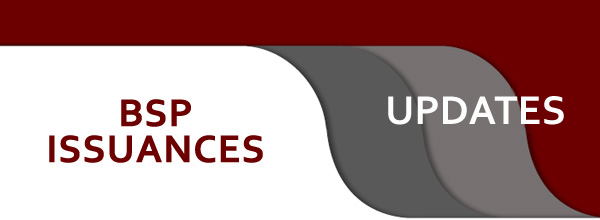
BSP Circular No. 1151, Series of 2022 Dated August 24, 2022
This amends the Minimum Capitalization of Rural Banks.
Section 121 of the Manual of Regulations for Banks (MORB), as amended by Circulars No. 1121 and 1142 dated 8 June 2021 and 29 March 2022, respectively, is hereby further amended, as follows:
| Bank Category | Required Minimum Capitalization |
| RBs | |
| Head Office | Only P50 million |
| Up to 5 branches | 50 million |
| 6 to 10 branches | 120 million |
| More than 10 branches | 200 million |


DOF Opinion 013-2022 dated July 20, 2022
Request for Review of BIR Ruling No. OT-206-2021 Dated 16 June 2021.
Taxpayer is a duly constituted non-stock, non-profit homeowner’s association registered with the SEC. Thus, taxpayer’s income derived from association dues and rentals of its facilities is exempt from income tax, VAT or percentage tax, whichever is applicable. Provided, that such income and dues shall be used for the cleanliness, safety, security, and other basic services needed by the members, including the maintenance of the facilities of their respective subdivisions or villages.
However, taxpayer shall be subject to the corresponding internal revenue taxes imposed under the NIRC, as amended, on its income not derived from association dues nor rentals of its facilities, which income should be returned for taxation. Likewise, interest income from currency bank deposits and yield or any other monetary benefit from deposit substitute instruments and from trust funds and similar arrangements, and royalties derived from sources within the Philippines are subject to the 20% final withholding tax; provided, however, that interest income derived by it from a depository bank under the expanded foreign currency deposit system shall be subject to 15% final withholding tax pursuant to Section 27 (D) (1) in relation to Section 57 (A), both of the NIRC, as amended. Taxpayer's gross receipts from operations not derived from rentals of its facilities, association dues, membership fees, other assessment and charges collected in purely reimbursement basis shall be subject to the 12% VAT imposed under Section 108 of the NIRC, as amended, or to the three percent (3%) tax imposed under Section 116 in relation to Section 109 (BB) of the NIRC if the gross sales or receipts from such sale of goods and services do not exceed Three Million Pesos (P3,000,000.00).
DOF Opinion No. 014.2022 dated August 12, 2022
Request for Review of BIR Ruling No. VAT-0331-2020 Dated 16 June 2020.
DOF held that BIR correctly ruled that the VAT is imposable on the aggregate sales price of the trade related properties comprised of the service gas stations and goodwill.
In CTA (Third Division) Case No. 8428, the sale of the Merchant Acquiring Business with the consequent transfer of shares is subjected to capital gains tax (CGT) and which necessarily includes the goodwill in the total consideration. Thus, whatever tax was imposed on the sale of the business, as the main transaction, is also imposed on the transfer of the attached goodwill valued by the seller to be paid by the buyer. Therefore, goodwill necessarily attaches to the trade related property which, in this case, is the sale of service gas stations.
In the instant case of TPC, the BIR ruled that the main transaction between FECI, a VAT-registered company, and TPC, the herein sale of service gas stations, is a transaction deemed sale subject to VAT pursuant to Section 105 of the NIRC. Consequently, the transfer of the attaching goodwill from FECI to TPC is necessarily also subjected to VAT.


Circular Letter No. 2022-40 dated August 9, 2022
Guidelines on voluntary cessation and withdrawal of pre-need business in the Philippines.
A domestic pre-need company intending to voluntarily cease and cancel the registration of all its pre-need plans and run-off its business must submit a letter of intent to voluntarily cease the sales and the cancellation of the registration of its pre-need plans and withdraw its pre-need business before the Insurance Commission.
Legal Opinion No. 2022-15 dated August 25, 2022
Legal Opinion on the Merger of Life Insurance Company with a Pre-Need Company.
It is clear that no provision of the Amended insurance Code of the Philippines and the Pre-Need Code of the Philippines expressly allows a merger between an insurance company and a corporation with different lines of business such as pre-need business.
Moreover, there are no existing Circular Letters and other Insurance Commission issued regulations explicitly or implicitly allowing the merger between an insurance company and other ordinary business corporation.
Other issuances by this Commission as regards mergers and acquisitions only provide guidelines on the merger or consolidation of two or more companies with the same line of business.
Applying the above, the Commission cannot legally allow the merger of Manulife Philippines, a life insurance company, and MFP, a pre-need company. Unless the authority for a particular merger is found in the laws governing the constituent corporations, statutory merger between the said two corporations is not possible.

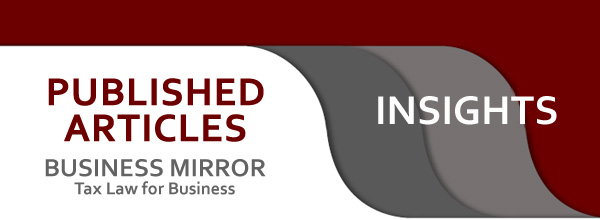
The Standard of Reasonableness
By Atty. Jomel N. Manaig
It is right and proper to ask for what is due. However, asking for too much often leads to no good thing. But how do you know when something is too much? Where do you draw the line between what is acceptable and what is not?
A standard that we could use to determine what should be enough is “reasonableness.” Is asking for a particular thing considered as reasonable? If it is not reasonable, it should not be asked much less be required.
This standard is applicable mainly to general aspects of life. But can we focus its application on a particular facet: say, tax? I say it is worth to have a considerable look at how reasonableness is applied in tax, whether it be in relation to assessments, refund, or compliance.
In the case of Philippine Airlines v. Commissioner of Internal Revenue (G.R. No. 206079-80), the Supreme Court had the opportunity to apply the standard of reasonableness on a requirement being imposed by the BIR when it comes to refund of tax withheld. Under its franchise agreement, PAL is exempt from tax on interest income earned from bank deposits, among others, and that any excess payment over taxes due from PAL shall either be refunded or credited against its tax liability for the succeeding taxable year.
The BIR, not keen on granting the refund, insisted that PAL failed to prove that the taxes withheld from its interest income were actually remitted. The Supreme Court, however, held that remittance need not be proven. PAL needs only to prove that taxes were withheld from its interest income.
Aside from the evident lack of responsibility on the part of PAL for the actual remittance to the BIR of the tax withheld, the Supreme Court also faulted the BIR from failing to appreciate the unreasonable difficulty that it would have put PAL in claiming the statutory exemption granted to it. In requiring that it prove actual remittance, the BIR effectively put the burden on PAL to prove that both the government and the banks complied with their legal obligation. It would have been near impossible for the taxpayer to demand to see the records of the payor bank or the ledgers of the government.
In other words, the BIR required something of PAL that the latter could not provide, not because of a lack of willingness to provide the information but by its near impossibility to do so. Indeed, this is an unreasonable requirement to unjustly defeat PAL’s statutorily granted tax exemption.
This kind of unreasonable requirement by the BIR is not limited to refund of taxes withheld. Other requirements of this nature exist in other aspects of tax.
In applications for refund of taxes, requiring documents not provided for or enumerated under pertinent revenue regulations and issuances as a condition prior to receiving the application is an unreasonable requirement. Taxpayer-claimants are guided by what is provided by revenue regulations and issuances. It is unreasonable to refuse their applications based on an undocumented requirement or a condition brought about by mere whim of a revenue official.
In claiming the benefits of VAT zero-rating for suppliers of registered export enterprises, requiring suppliers to prove that the purchases made by the registered export enterprises are used directly and exclusively in the registered project (aside from the sworn affidavit) is not a reasonable requirement. Suppliers do not have access to the accounting, production, and financial records of the registered export enterprises. Forcing the former to produce information that is held only by the latter to enjoy VAT zero-rating incentive is an unreasonable requirement.
In tax compliance, taxpayers are at times hit with sudden bouts of open cases for alleged unfiled tax returns or other reportorial requirements dating back to more than a decade. They are then asked to produce these documents under pain of stiff fines. It should be noted that taxpayers are only required to retain or preserve their records for ten (10) years reckoned from the filing of the related return or its deadline, whichever is later. The first five (5) years would require taxpayers to retain the hard copies while the only electronic copies are required thereafter. Demanding taxpayers to produce documents far beyond the mandatory preservation period is therefore unreasonable.
These are just some aspects of tax which the prudent exercise of the standard of reasonableness would do wonders. We do not need a separate Supreme Court case tackling these specific problems in particular before we can apply them. The standard of reasonableness should be universal in application.
Reasonableness should not be in such short supply that we lose sight of what is clear before us. It should not be shunned so as to defeat what taxpayers are duly entitled to. It should not be disregarded so as to ask for more than what is due
.
----------------------------------------------
For inquiries on the article, you may call or email
ATTY. JOMEL N. MANAIG
Managing Partner
T: +63 2 8403 2001 loc. 380
This email address is being protected from spambots. You need JavaScript enabled to view it.


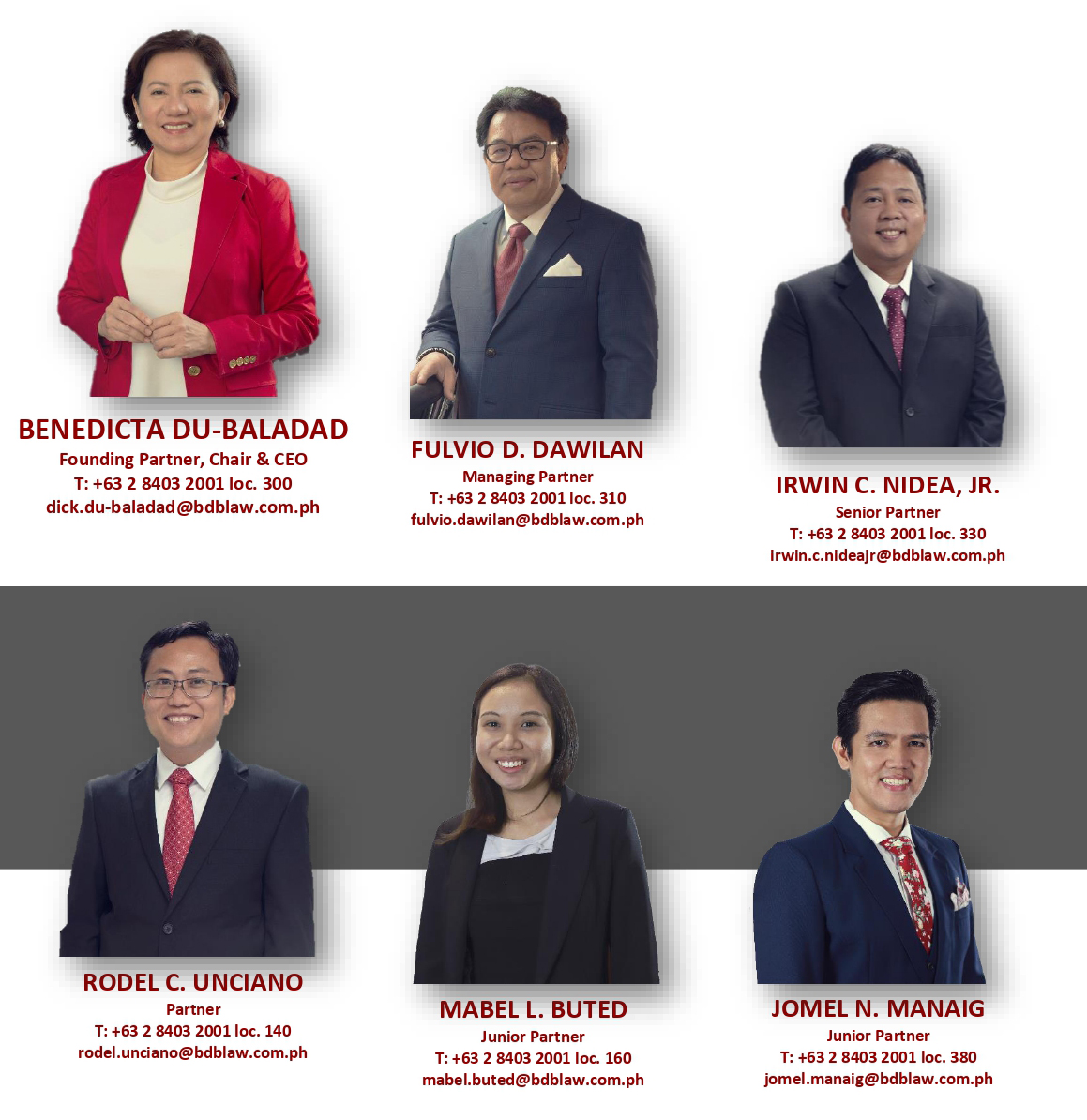
DISCLAIMER: The contents of this Insights are summaries of selected issuances from various government agencies, Court decisions and articles written by our experts. They are intended for guidance only and as such should not be regarded as a substitute for professional advice.
Copyright © 2022 by Du-Baladad and Associates (BDB Law). All rights reserved. No part of this issue covered by this copyright may be produced and/or used in any form or by any means – graphic, electronic and mechanical without the written permission of the publisher.





